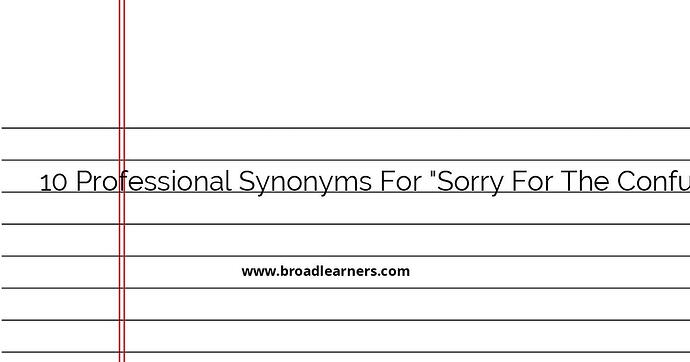When addressing confusion in an email, it's essential to convey your apology while maintaining a professional tone. Using alternatives to 'Sorry for the Confusion' can help you express your regret effectively. In this guide, we have compiled 10 professional synonyms for 'Sorry for the Confusion' that you can use in your email communication:
- Apologies for the mix-up.
- I regret any misunderstanding caused.
- Please excuse the confusion.
- I apologize for any uncertainty this may have caused.
- Regret any inconvenience due to the confusion.
- Apologies for any perplexity experienced.
- I acknowledge any confusion that may have arisen.
- I apologize for any disarray this may have caused.
- Please pardon any mix-up in my previous message.
- Sorry for any bewilderment caused.
Let's delve into each alternative to 'Sorry for the Confusion' in more detail:
1. Apologies for the mix-up
This phrase acknowledges that there was a mistake or misunderstanding that led to confusion, and you are expressing regret for the situation.
Example:
Dear [Recipient's Name],
Apologies for the mix-up regarding the meeting time. Let me clarify the details for you.
Thank you for your understanding.
Best regards, [Your Name]
2. I regret any misunderstanding caused
By stating that you regret any misunderstanding caused, you are showing empathy towards the recipient and taking responsibility for the confusion.
Example:
Dear [Recipient's Name],
I regret any misunderstanding caused by the unclear instructions. Please let me know if you need further clarification.
Thank you for your patience.
Best regards, [Your Name]
3. Please excuse the confusion
This phrase politely asks the recipient to forgive the confusion that occurred, indicating that you acknowledge the mistake and are seeking understanding.
Example:
Dear [Recipient's Name],
Please excuse the confusion in my previous email. Allow me to provide you with the correct information.
Thank you for your cooperation.
Best regards, [Your Name]
4. I apologize for any uncertainty this may have caused
By apologizing for any uncertainty created, you are expressing remorse for the confusion and aiming to clarify the situation for the recipient.
Example:
Dear [Recipient's Name],
I apologize for any uncertainty this may have caused. Let me provide you with the correct details promptly.
Thank you for your understanding.
Best regards, [Your Name]
5. Regret any inconvenience due to the confusion
This phrase conveys your regret for any inconvenience the confusion may have caused, emphasizing your concern for the recipient's experience.
Example:
Dear [Recipient's Name],
Regret any inconvenience due to the confusion in our correspondence. I will ensure clarity in all future communications.
Thank you for your patience.
Best regards, [Your Name]
6. Apologies for any perplexity experienced
By apologizing for any perplexity experienced by the recipient, you are addressing the confusion with a tone of understanding and humility.
Example:
Dear [Recipient's Name],
Apologies for any perplexity experienced due to the miscommunication. I will clarify the details promptly.
Thank you for your cooperation.
Best regards, [Your Name]
7. I acknowledge any confusion that may have arisen
This phrase shows that you acknowledge the confusion that arose and are ready to take steps to resolve the issue and provide clarity.
Example:
Dear [Recipient's Name],
I acknowledge any confusion that may have arisen from my previous message. Let me address the issues and provide you with the correct information.
Thank you for your understanding.
Best regards, [Your Name]
8. I apologize for any disarray this may have caused
By apologizing for any disarray resulting from the confusion, you are showing accountability and a willingness to rectify the situation.
Example:
Dear [Recipient's Name],
I apologize for any disarray this may have caused in our communication. Allow me to provide you with a clear explanation.
Thank you for your patience.
Best regards, [Your Name]
9. Please pardon any mix-up in my previous message
This phrase seeks the recipient's pardon for any mix-up that occurred in your previous message, demonstrating your willingness to address and correct the confusion.
Example:
Dear [Recipient's Name],
Please pardon any mix-up in my previous message that led to confusion. Let me clarify the details for you.
Thank you for your cooperation.
Best regards, [Your Name]
10. Sorry for any bewilderment caused
This phrase expresses your regret for any bewilderment caused by the confusion, showing your concern for the recipient's clarity and understanding.
Example:
Dear [Recipient's Name],
Sorry for any bewilderment caused by the unclear information. Let me provide you with the correct details promptly.
Thank you for your patience.
Best regards, [Your Name]
These 10 professional synonyms for 'Sorry for the Confusion' can help you express your apologies in a clear and considerate manner. By choosing the right phrase, you can address the confusion effectively while maintaining a professional and respectful tone in your email correspondence.
Did I miss anything? Respond below
